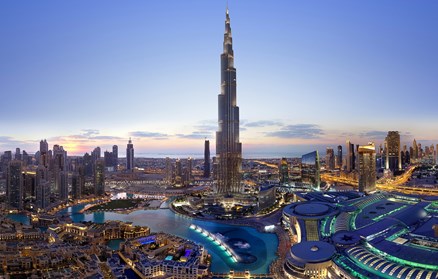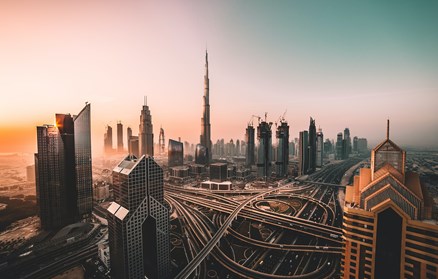ENERGY
While Dubai has a small share of the total oil and gas energy resources of the UAE, the city continues to diversify its energy mix and has become a regional hub for renewable and clean energy in recent years. Dubai is home to the government-owned oil and gas company Emirates National Oil Company (ENOC), as well as large multinationals including BP, China Petroleum Engineering & Construction Company (CPECC), Halliburton, and Schlumberger to name just a few.
With the demand for energy in the Middle East and North Africa projected to more than double in the next decade, renewable energy and clean technology have become a priority. Moving the focus away from fossil fuel, Dubai is setting the benchmark in these fields in order to meet the objectives of the Integrated Energy Strategy 2030. The total investment in clean energy in the region is projected to exceed US$300 billion by 2050 and over US$100 billion worth of alternative and sustainable energy projects are already in the pipeline. With Dubai’s population expected to increase from 2.9 million in 2020 to 5.2 million by 2030 the Emirate is focused on preparing its energy sector to be able to meet these increasing demands.
Dubai’s Clean Energy Strategy
In order to accelerate the transition to a green economy, Dubai has set out the Clean Energy Strategy 2050 which aims to make the city a regional centre for green energy by 2050 by reducing the carbon footprint of power generation by 70 percent, making Dubai the city with the world’s smallest carbon footprint. As part of the strategy, the government has set up the Dubai Green Fund and earmarked US$27 billion to support various projects including solar power and initiatives related to the retrofitting of buildings by providing easy, low-interest loans to clean-energy investors. The strategy also includes a state-of-the-art innovation centre which will feature R&D units specialising in next generation clean energy technologies. In total, US$136 million will be invested in R&D towards improving energy efficiency, integrating smart grids, and generating solar-powered electricity.
Renewable Energy Innovation
Dubai is home to some of the world’s largest state-of-the-art renewable energy facilities:
-
Sheikh Mohammed Bin Rashid Al Maktoum Solar Park - the US$13.6 billion facility, with a planned capacity of 5,000MW by 2030 will be the largest single-site solar park in the world once completed.
-
Hatta Hydroelectric Power Station - Dubai Electricity & Water Authority (DEWA) is building a pumped-storage hydroelectric power station at Hatta Dam that will be the first first of its kind in the region with a capacity of 250MW once completed in 2024.







